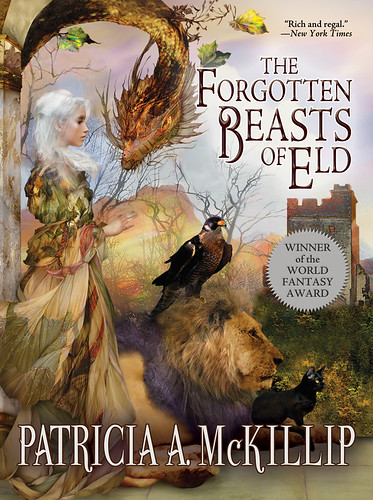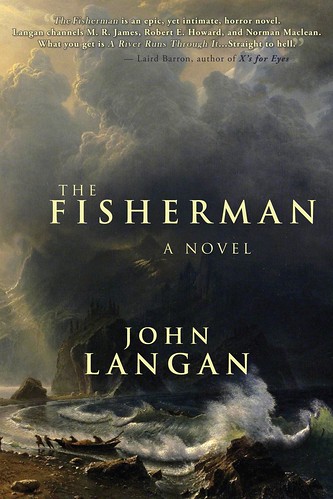My most recent project was The Forgotten Beasts of Eld by Patricia A. McKillip, forthcoming in September from Tachyon Publications.
by Patricia A. McKillip, forthcoming in September from Tachyon Publications.
I'll admit that I had not read this book previously (it was originally published in 1974), and to my delight, the story had me intrigued from the very beginning. Which seems to be the overall consensus from the many reviews I have read since completing work on this project.
The Forgotten Beasts of Eld has the honor of winning the very first World Fantasy Award for Best Novel, presented in 1975 at the first World Fantasy Convention, held in Providence, Rhode Island, the home of H. P. Lovecraft.
The Forgotten Beasts of Eld has the honor of winning the very first World Fantasy Award for Best Novel, presented in 1975 at the first World Fantasy Convention, held in Providence, Rhode Island, the home of H. P. Lovecraft.
This is one project that I wanted to keep working on, and working on...not to be done with the project itself, but to find out what came next in the story. And as noted in one of the reviews I read, the prose is so seductive that I had to keep reminding myself that this is work!
Here are some mini excerpts from a few of those reviews I read, with links to the full reviews (and doing my best not to reveal too many spoilers):
I admit it: I have been seduced by Patricia A McKillip's The Forgotten Beasts of Eld, ...the latest in my trawl through fantasy champions of days gone by. Gorgeous, lyrical prose, a story that is more than just a linear journey from one drama to another, and a three-dimensional female character: it feels a million miles away from my manful slogs through Michael Moorcock's Corum trilogy, and Poul Anderson's Hrolf Kraki's Saga....I think I've fallen for this book because it's so different to what I was expecting: a cool drink of water in the midst of the overwrought, derivative, under-edited and overwritten tomes that dominate much of fantasy today – and, judging from my excursions into Corum and Kraki, did in the past as well.—Alison Flood, The Guardian Books Blog
The Forgotten Beasts of Eld is a gorgeously told tale of love and the human cost of war and revenge. It has a love of riddles, inventive magical beasts, and a well-drawn cast of believable characters with a strong, engaging female protagonist. However what truly elevates the book is Patricia A. McKillip's poetic language. Her command of striking imagery and finely balanced phrases places The Forgotten Beasts of Eld in another category altogether, ...a high Fantasy that almost qualifies as a prose poem....The complexity of the book's view of love, as something that ties the couple together but that can also be twisted and subverted into something damaging and ugly, is refreshing. In the end it is not just their love that pulls Coren and Sybel back from the brink, but knowledge, wisdom and self-awareness. Both Coren and Sybel, having looked into themselves, can see something of Drede in themselves, a man who let his feelings for his wife be twisted into something unpleasant and destructive by his fear and jealousy. Coren and Sybel first have to reject their own destructive, violent impulses, before they can return to each other purified....—worldswithoutend.com
There is a sense of antiquity about this book -- and by that I don't mean dusty obsolescence and a sliding into oblivion. On the contrary, this is one of those shining complex things that our ancestors seemed to find it easy to do and that we have somehow forgotten in the rush and spin of our modern days -- this has the feel to it of a tale that has come down from some ancient dawn, a day long gone, but it is bright with the ancient magic and it feels ageless, eternal......There are fantasy tropes aplenty in this book -- animals that never were and that you wish could have been, cold sorcery, human drama involving inheritances and betrayals and wise enchantresses, lost prince-heirs, and much else besides. McKillip weaves them with the light touch of her own magic. It might all sound kind of recognisable, even familiar -- there are dozens and dozens of fantasy tales involving talking beasts and dragons and human wars and romances -- but somehow, here, you feel like you're drinking it from the source.—Alma A. Hromic, SF Site
The Forgotten Beasts of Eld will be published in September and is now available for preorder directly from the publisher, Tachyon Publications, or from Amazon.com , or your friendly neighborhood bookseller.
, or your friendly neighborhood bookseller.



